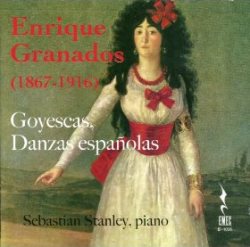| 
|
Enrique GRANADOS (1867-1916)
Danzas espaņolas (1892-1900) [56:31]
Goyescas, Op.11 (1911) [54:09]
El Pelele (Escena goyesca) (1914) [4:49]
Sebastian Stanley (piano)
rec. June 2012, Auditorio Centro Cultural La Marina ‘Caja Espaņa’, Zamora
EMEC E105/6 [56:31 + 59:58]
The young British pianist Sebastian Stanley clearly has a penchant for Spanish music. His first disc was called El amor y la muerte and released in 2010 as the first release in his four-year contract with Spanish label EMEC Discos. This latest CD, recorded in 2012, would seem to be the second.
It’s in book format, one CD sitting above the other in a plastic housing. Reviewers often grumble about the impracticality of such matters, rather as if one can’t lay the thing sideways, on top of one’s shelf. I have a lot of book format releases and I’d far rather have them for what they contain than go on about how to store them.
That over, one can turn to Sebastian Stanley’s take on Granados. I like the take. It’s thoroughly musicianly and sensitively shaped. He does indeed show an affinity for the repertoire and one can’t point to any lack of stylistic assurance.
In the sequence of Danzas espaņolas he is good at catching the healthy vigour of the writing – the third dance is a particularly assured example of his art in this cycle. The opening dance is taken quite lightly – both in texture and in spirit – whereas Alicia de Larrocha in her Decca set prefers a more defined rhythmic approach with more searching rubati. There’s a bit too much pedal in Oriental, the second dance, so that the music’s internal contrasts aren’t as striking as they could be. But the Villanesca is attractive, and quite sweeping in tempo. Possibly the Aragonesa opens a little grudgingly, but it soon recovers. Sometimes one feels Sebastian is a touch constrained – he is not amenable to the full range of moods of Dance VIII, for instance, remaining clement where a more joyful approach would sweep away the relative neutrality. He also misses – as de Larrocha does not – the festive quotient in the ninth dance. He also offers a very personal take on the eleventh dance which he takes rather slowly. The result is an unusually introspective slant, though it inevitably doesn’t possess the dancing spirit to be found in other performances. It is, after all, a Zambra mora dance. His final dance is quite angular and quick.
He is consistently slower than de Larrocha, one of the great exponents of the work, in Goyescas. It’s largely a question of phrasing and pulse, a sense too of natural rubati and those colorations that mark out the most assured stylists in this music. Thus he is fine, if heard in isolation, in Los requiebros but she is more supple, phrasally suggestive and plaint. Throughout, his approach is sensitive but again, just a touch on the calm side, so the fervour of Coloquio en la reja is more muted and whilst well-played El Fandango del candil lacks the last ounce of sultry urgency. A slightly less steady tempo might have helped El amor y la muerte.
So, pluses and minuses in this twofer. The recording is good and the documentation comes in an ordinarily-sized CD booklet.
Jonathan Woolf
 |
 |
|



 All Nimbus reviews
All Nimbus reviews








